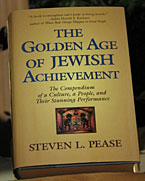Introduction©
Asked why he, a Gentile, was donating $1 million to the Aish Ha Torah's World Outreach Center in Jerusalem, the successful American entrepreneur, John Kluge, responded:
'Last year I turned 80 years old. At my birthday party, I realized 85 percent of my friends are Jews. I have always admired the Jewish people and their contributions to humanity, to civilizing the World. What Aish Ha Torah is doing to reconnect Jews with their heritage, to strengthen their roots, to educate them of their values, is enabling the Jewish people to continue to be able to play their incredibly valuable role in history.'
What follows can hardly compare with Kluge's generosity, but it arises from a similar impulse: recognition of many rich and rewarding friendships, appreciation for the immensely valuable role Jews have played over their 4,000 year history, and an effort to explore their achievements and the culture that brought them about.
A Presbyterian by upbringing, of Scots Irish, English and German heritage, I cannot claim any Jewish genes. Instead, from my kindergarten playmate, to the boss who gave me my first shot at line management, countless associates, Board members to whom I reported, employees who reported to me, and numerous competitors, associates, fellow board members and friends, Jews have played a long and important role in my life. Without demeaning non-Jews, the vitality and determination of Jews has been as delightful as the warmth of their friendship and pleasure of their humor. In the later Chapter on Education, Gordon Gee, President of Vanderbilt is quoted as saying, Jews 'by culture and by ability and by the very nature of their liveliness, make a university a much more habitable place in terms of intellectual life.' That has been my experience and it contributed to the motivation for this book.
The primary audience for this book is non-Jews, but the ironic likelihood is that it will be read mostly by Jews. They, of course, have interest in their most accomplished people, and in the commentary about their culture of achievement. Jews also tend to be substantially more well read and more likely to read, study, and debate such issues than their non-Jewish contemporaries. That observation is sustained by much of what follows in this book.
My message is directed at recognizing just how important their performance has been, and at the critical role their culture, which arose first from their religion, but evolved continuously over time, has played in creating an ethos wherein high achievement is treasured. Stated simply, culture matters. Exploring and understanding its role can be useful in helping us think about where we place our own values, what we treasure, and the critical inspiration culture provides in shaping us and our succeeding generations.
With that said, I do not presume all of my ideas and theories are correct. Instead, I hope to provoke discussion and debate. I believe this book, and the facts it reports, clearly prove the disproportionate performance of Jews in this, their Golden Age. But as to the transferable lessons to be learned, hopefully those will arise from the ensuing discussion and be sharpened by it.
